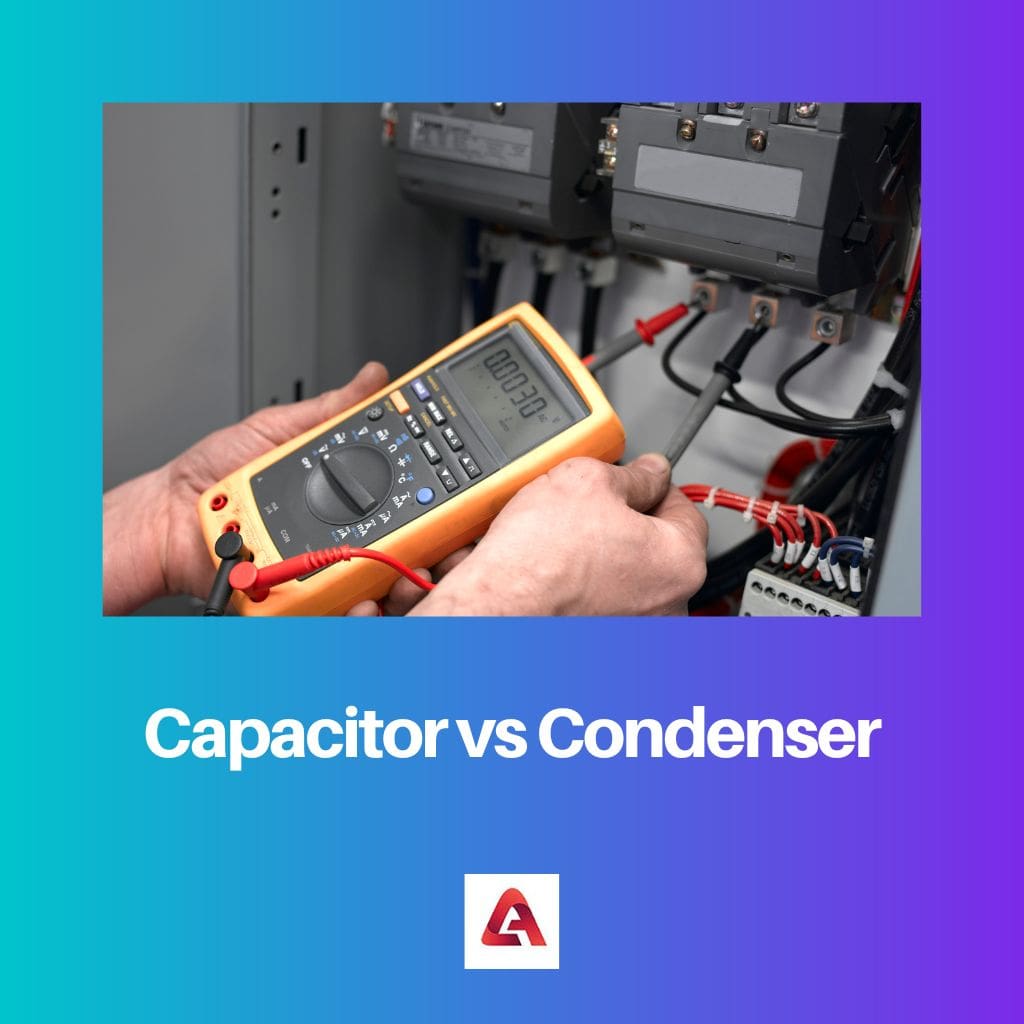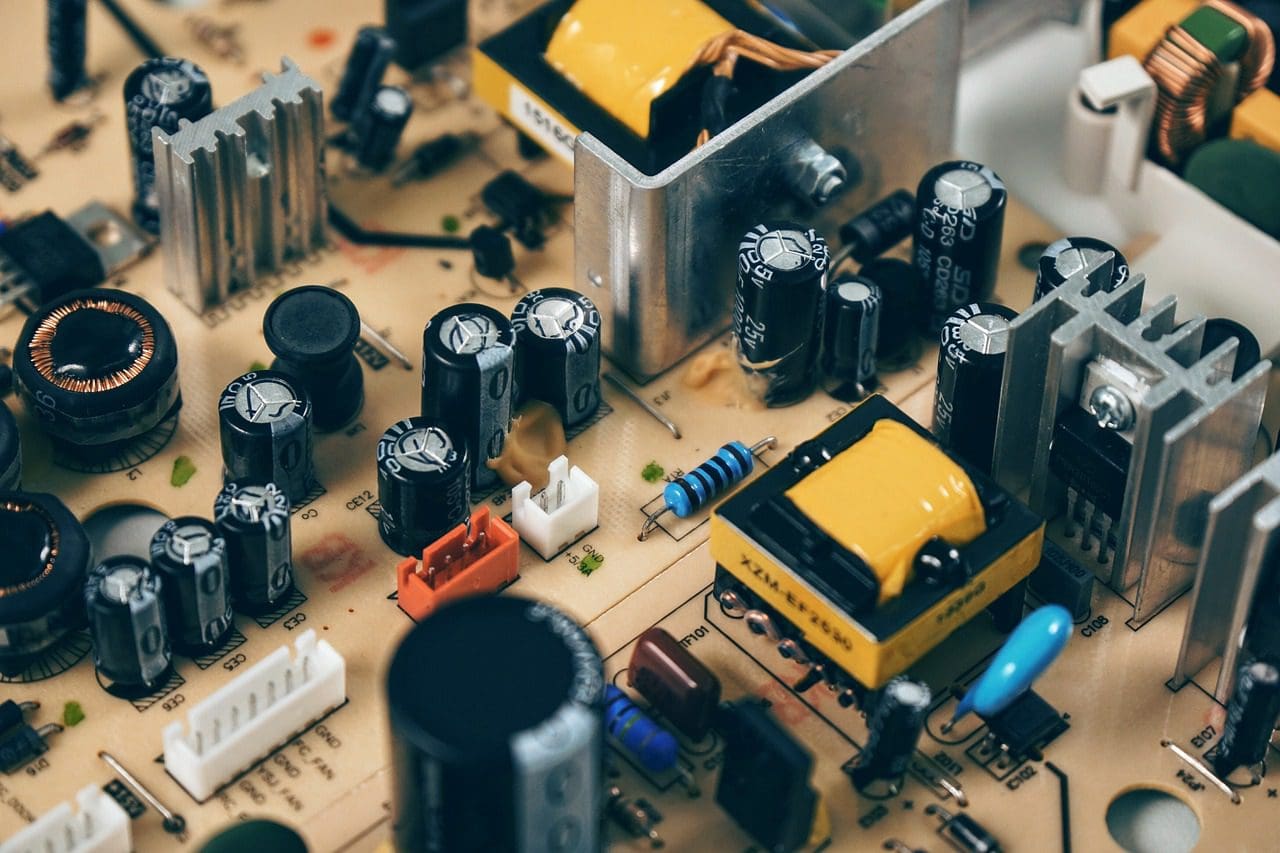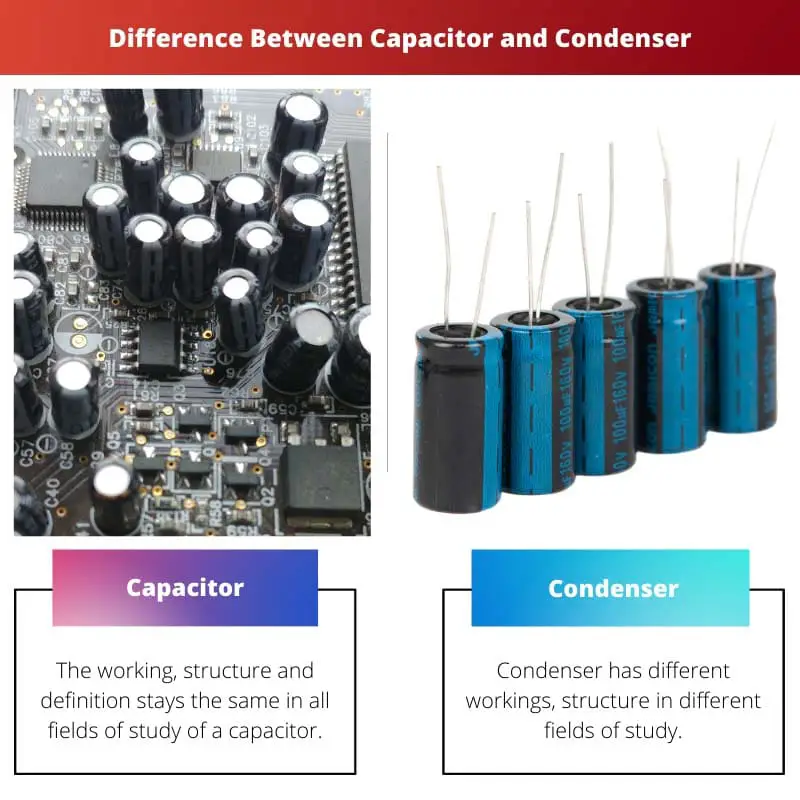The electronic devices that can store electrical charge in them are called capacitors. Also, they can omit the passage of an AC flowing through them.
The structure of a capacitor consists of at least two conducting plates with a layer of dielectric material in between them.
Key Takeaways
- Capacitor is an electronic component that stores and releases electrical energy in a circuit by accumulating and separating electric charges on two conductive plates separated by an insulating material.
- Condenser is an older term for a capacitor, used primarily in the early days of electronics, and both terms refer to the same component with the same function.
- There is no functional difference between a capacitor and a condenser; the terms are interchangeable, with “capacitor” being the more commonly used term in modern electronics.
Capacitor vs. Condenser
The difference between Capacitor and Condenser is that compared to the word condenser, the capacitor is a relatively newer term. There is no difference in the working mechanism or the structure; it’s just that condenser is an older term used for capacitors.

When a voltage is applied between two wires, a potential difference is created, generating a static electric field separated by the dielectric in positive and negative charges.
The negative charges get stored at the negative pole of the capacitor, and the positive charges at the positive pole.
The term capacitor came into use from the year 1926. Before that, the term condenser was used in its place. Capacitor has only one definition in all fields of study, while a condenser can mean different instruments in other fields of study.
Comparison Table
| Parameters of Comparison | Capacitor | Condenser |
|---|---|---|
| Term | Condenser is an old term used for a capacitor. | Condenser is an old term used for capacitor. |
| Year | The term capacitor fully replaced the term condenser in the year 1926. | The term condenser was stopped from using from the year 1926. |
| Definition in other fields of study | The working, structure, and definition stay the same in all fields of study of a capacitor. | Condenser has different workings and structures in different fields of study. It can also be a whole different device in some studies. |
| Energy conversion | The energy stored in the capacitor turns into an electric field between the plates of the capacitor. | The energy stored in a condenser gets turned into an electrostatic field between the poles of the condenser. |
| Uses | Capacitors are used for signal coupling, motor starting, decoupling, filtering, in-memory applications, etc. | Condensers convert gas into a fluid by removing the heat present in the system and as an optical instrument that focuses the light beam at one point. |
What is Capacitor?
A capacitor can be described as a system of two or more conducting bodies with a layer of dielectric between them that can accumulate electricity.
The capacitance of a capacitor depends on the dielectric present between the conducting plates.
Also, the capacitance increases with the increase in the surface area of the plates and decreases with the distance between them. To obtain a higher capacitance, the capacitors can be grouped.
When grouped in parallel, the capacitance of the whole system increases. When grouped in series, the capacitance of the whole system decreases.
Depending on the manufacturing method, capacitors are divided into electrolytic, electrostatic, and electrochemical.

What is Condenser?
Condenser is an older term used for capacitors. To be precise, the term was stopped from using from 1926 when the term capacitor was more commonly used.
From an electrical perspective, both capacitors and condensers are the same devices. There is no difference in their definition, work, or structure.
But when seen in other fields of study, the term condenser may describe other devices.
For example, if looked at from an optical perspective, the condenser can be described as an optical system that helps focus the rays of light from a light source into a more focused and narrower beam.
From a mechanical perspective, it can be described as a device used to condense gas into liquid by decreasing the heat in the system.

Main Differences Between Capacitor and Condenser
- The capacitor is a newer term, while the condenser is an old term. It has been used in place of the term condenser for a long time.
- The capacitor was scientifically put in place of the term condenser in 1926. After that, the term condenser was rarely used.
- The energy stored in the capacitor is turned into an electric field that flows between the capacitor plates. In contrast, the energy stored in a condenser is turned into an electrostatic field that flows between the poles of the condenser.
- The structure, working mechanism, and definition of a capacitor never change in any field of study while the working mechanism and structure of a condenser are different in other fields. Sometimes, the condenser can also be a whole different device.
- Examples of the use of capacitors are signal coupling, decoupling, motor starting, filtering, computer memory applications, etc. In contrast, examples of condensers are the optical instrument that focuses the light beam at one point and a device used to convert gas into a fluid by removing the heat in the system.


This article’s comprehensive and precise explanations offer valuable insights into the pivotal distinctions between capacitors and condensers, enhancing readers’ understanding of these electrical components.
The article’s precision in explicating the divergences between capacitors and condensers significantly illuminates these electrical components, fostering an enriched understanding thereof.
I totally concur with Joe83. The article serves as a remarkable elucidation of the intricate nuances between capacitors and condensers.
The post provides a comprehensive and insightful comparison between capacitors and condensers, shedding light on their distinctions and significances with great clarity.
The post distinctly articulates the differences between capacitors and condensers and explains them in a coherent manner. It’s an intellectual refinement on a complex topic.
I couldn’t agree more. The well-structured comparison helps in grasping the nuances between capacitors and condensers.
I appreciate the clear comparison of capacitors and condensers in terms of their historical usage and evolution. It adds depth to the understanding of these electrical components.
Absolutely. Understanding the historical context enriches our comprehension of these devices and their nomenclature.
The article is a commendable assembly of in-depth analysis, offering an insightful discourse on the historical evolution and operative disparities of capacitors and condensers.
The article’s insightful synthesis of historical and operational distinctions between capacitors and condensers enriches readers’ understanding, encapsulating a wide array of pertinent aspects.
Absolutely. It meticulously draws attention to the historical transitions and operational differentiations of capacitors and condensers, presenting an intellectually stimulating read.
Very informative explanation about how a capacitor works and its differences with a condenser. It provides clarity on a complex topic.
Great post for beginners to electronics. Explains intricate concepts in an understandable way.
I completely agree. This article really clears up a lot of the confusion around the terminology and working of capacitors and condensers.
The article adeptly navigates through the historical and contemporary aspects of capacitors and condensers, providing a lucid depiction of their intricacies and working mechanisms.
Indeed, the article’s scholarly account scrutinizes the historical and technical dimensions, making it an intellectually gratifying read for enthusiasts and novices alike.
The article’s adept exploration of the electrical and historical facets illuminates complex concepts and terminologies, catering to readers with diverse levels of expertise.
The article aptly presents the intricate details of capacitors and condensers, making it accessible and understandable for readers from diverse backgrounds.
Indeed, the article’s lucid explanations ensure the topic is approachable and appealing to readers with varying degrees of familiarity with electronics.
I like the historical perspective – understanding that condenser and capacitor were interchangeable terms originally.
Yes, it’s interesting to know the evolution of terminology within electronics and the precise moment when capacitor replaced condenser.
The article intriguingly addresses the historical and technical aspects of capacitors and condensers, remarkably demystifying intricate terminologies and concepts.
Absolutely. It offers an engaging portrayal of the historical and technical dimensions, unraveling complexities associated with capacitors and condensers.
The article’s captivating elucidation of capacitor and condenser terminologies heightens the readers’ understanding, while providing historical insights.
I believe the notion that the terms ‘condenser’ and ‘capacitor’ are interchangeably used in some fields needs further elaboration. Could there be potential miscommunication due to this?
I agree. The article should delve deeper into the implications of these interchangeable terms in different fields of study to avoid potential miscommunications.
This issue indeed warrants an in-depth exploration. The article’s authors should address this concern to ensure clarity on these terms in diverse contexts.